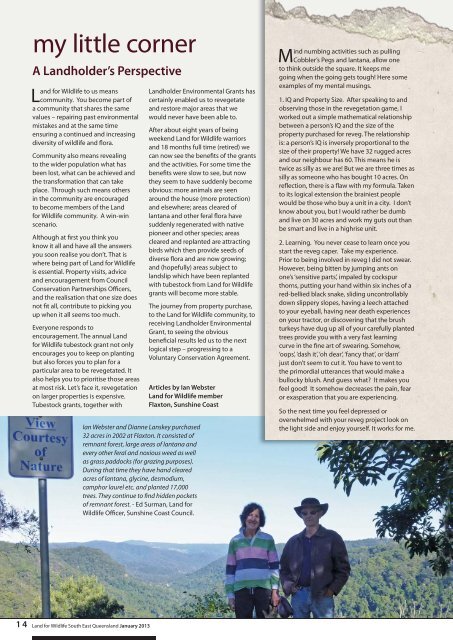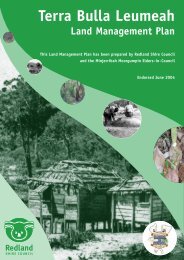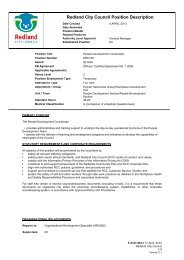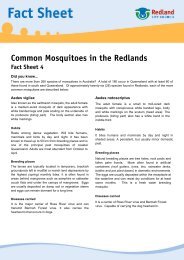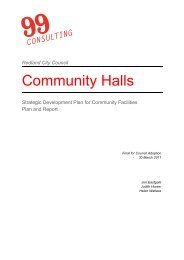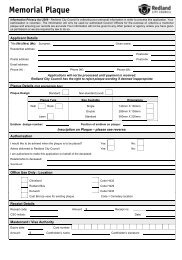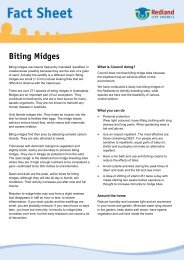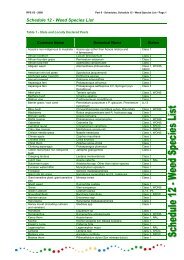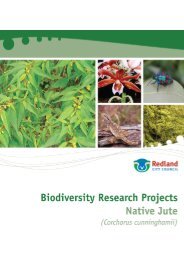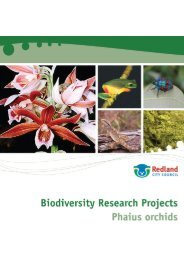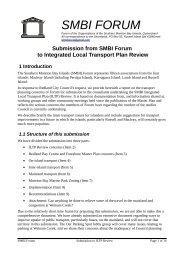Land for Wildlife Newsletter - IndigiScapes
Land for Wildlife Newsletter - IndigiScapes
Land for Wildlife Newsletter - IndigiScapes
Create successful ePaper yourself
Turn your PDF publications into a flip-book with our unique Google optimized e-Paper software.
my little corner<br />
A <strong>Land</strong>holder’s Perspective<br />
<strong>Land</strong> <strong>for</strong> <strong>Wildlife</strong> to us means<br />
community. You become part of<br />
a community that shares the same<br />
values – repairing past environmental<br />
mistakes and at the same time<br />
ensuring a continued and increasing<br />
diversity of wildlife and flora.<br />
Community also means revealing<br />
to the wider population what has<br />
been lost, what can be achieved and<br />
the trans<strong>for</strong>mation that can take<br />
place. Through such means others<br />
in the community are encouraged<br />
to become members of the <strong>Land</strong><br />
<strong>for</strong> <strong>Wildlife</strong> community. A win-win<br />
scenario.<br />
Although at first you think you<br />
know it all and have all the answers<br />
you soon realise you don’t. That is<br />
where being part of <strong>Land</strong> <strong>for</strong> <strong>Wildlife</strong><br />
is essential. Property visits, advice<br />
and encouragement from Council<br />
Conservation Partnerships Officers,<br />
and the realisation that one size does<br />
not fit all, contribute to picking you<br />
up when it all seems too much.<br />
Everyone responds to<br />
encouragement. The annual <strong>Land</strong><br />
<strong>for</strong> <strong>Wildlife</strong> tubestock grant not only<br />
encourages you to keep on planting<br />
but also <strong>for</strong>ces you to plan <strong>for</strong> a<br />
particular area to be revegetated. It<br />
also helps you to prioritise those areas<br />
at most risk. Let’s face it, revegetation<br />
on larger properties is expensive.<br />
Tubestock grants, together with<br />
<strong>Land</strong>holder Environmental Grants has<br />
certainly enabled us to revegetate<br />
and restore major areas that we<br />
would never have been able to.<br />
After about eight years of being<br />
weekend <strong>Land</strong> <strong>for</strong> <strong>Wildlife</strong> warriors<br />
and 18 months full time (retired) we<br />
can now see the benefits of the grants<br />
and the activities. For some time the<br />
benefits were slow to see, but now<br />
they seem to have suddenly become<br />
obvious: more animals are seen<br />
around the house (more protection)<br />
and elsewhere; areas cleared of<br />
lantana and other feral flora have<br />
suddenly regenerated with native<br />
pioneer and other species; areas<br />
cleared and replanted are attracting<br />
birds which then provide seeds of<br />
diverse flora and are now growing;<br />
and (hopefully) areas subject to<br />
landslip which have been replanted<br />
with tubestock from <strong>Land</strong> <strong>for</strong> <strong>Wildlife</strong><br />
grants will become more stable.<br />
The journey from property purchase,<br />
to the <strong>Land</strong> <strong>for</strong> <strong>Wildlife</strong> community, to<br />
receiving <strong>Land</strong>holder Environmental<br />
Grant, to seeing the obvious<br />
beneficial results led us to the next<br />
logical step – progressing to a<br />
Voluntary Conservation Agreement.<br />
Articles by Ian Webster<br />
<strong>Land</strong> <strong>for</strong> <strong>Wildlife</strong> member<br />
Flaxton, Sunshine Coast<br />
Ian Webster and Dianne Lanskey purchased<br />
32 acres in 2002 at Flaxton. It consisted of<br />
remnant <strong>for</strong>est, large areas of lantana and<br />
every other feral and noxious weed as well<br />
as grass paddocks (<strong>for</strong> grazing purposes).<br />
During that time they have hand cleared<br />
acres of lantana, glycine, desmodium,<br />
camphor laurel etc. and planted 17,000<br />
trees. They continue to find hidden pockets<br />
of remnant <strong>for</strong>est. - Ed Surman, <strong>Land</strong> <strong>for</strong><br />
<strong>Wildlife</strong> Officer, Sunshine Coast Council.<br />
Mind numbing activities such as pulling<br />
Cobbler’s Pegs and lantana, allow one<br />
to think outside the square. It keeps me<br />
going when the going gets tough! Here some<br />
examples of my mental musings.<br />
1. IQ and Property Size. After speaking to and<br />
observing those in the revegetation game, I<br />
worked out a simple mathematical relationship<br />
between a person’s IQ and the size of the<br />
property purchased <strong>for</strong> reveg. The relationship<br />
is: a person’s IQ is inversely proportional to the<br />
size of their property! We have 32 rugged acres<br />
and our neighbour has 60. This means he is<br />
twice as silly as we are! But we are three times as<br />
silly as someone who has bought 10 acres. On<br />
reflection, there is a flaw with my <strong>for</strong>mula. Taken<br />
to its logical extension the brainiest people<br />
would be those who buy a unit in a city. I don’t<br />
know about you, but I would rather be dumb<br />
and live on 30 acres and work my guts out than<br />
be smart and live in a highrise unit.<br />
2. Learning. You never cease to learn once you<br />
start the reveg caper. Take my experience.<br />
Prior to being involved in reveg I did not swear.<br />
However, being bitten by jumping ants on<br />
one’s ‘sensitive parts’, impaled by cockspur<br />
thorns, putting your hand within six inches of a<br />
red-bellied black snake, sliding uncontrollably<br />
down slippery slopes, having a leech attached<br />
to your eyeball, having near death experiences<br />
on your tractor, or discovering that the brush<br />
turkeys have dug up all of your carefully planted<br />
trees provide you with a very fast learning<br />
curve in the fine art of swearing. Somehow,<br />
‘oops’, ‘dash it’, ‘oh dear’, ‘fancy that’, or ‘darn’<br />
just don’t seem to cut it. You have to vent to<br />
the primordial utterances that would make a<br />
bullocky blush. And guess what? It makes you<br />
feel good! It somehow decreases the pain, fear<br />
or exasperation that you are experiencing.<br />
So the next time you feel depressed or<br />
overwhelmed with your reveg project look on<br />
the light side and enjoy yourself. It works <strong>for</strong> me.<br />
14<br />
<strong>Land</strong> <strong>for</strong> <strong>Wildlife</strong> South East Queensland January 2013


